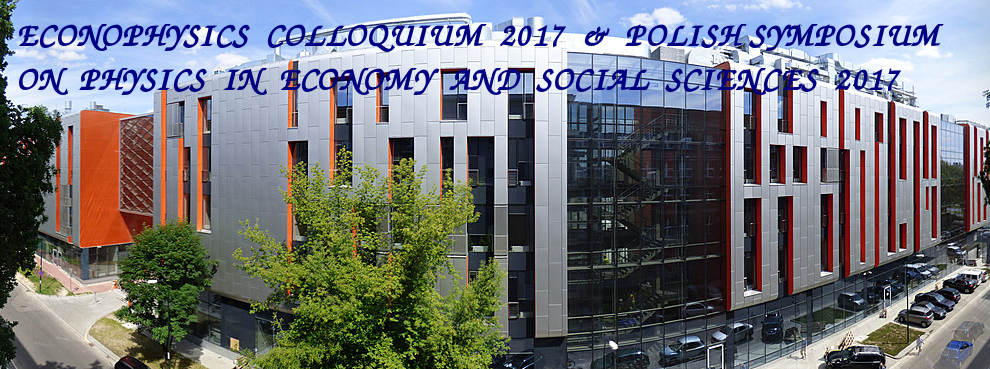
|
|

|
|
 Upcoming joint event EC2017 & FENS2017 will be held at University of
Warsaw
Upcoming joint event EC2017 & FENS2017 will be held at University of
Warsaw
Physics, economics, sociology, mathematics, and computer science are fields of science which, as a result of cross-fertilisation, have created the multi-, cross-, and interdisciplinary areas of science and research such as econophysics and sociophysics, thriving in the last two and a half decades. They use knowledge, methodologies, methods and tools of physics for modeling, explaining and forecasting economic and social phenomena and processes. The (thirteenth) Econophysics Colloquium (EC2017) jointed with (ninth) Polish Symposium on Physics in Economy and Social Sciences (Polish acronym FENS2017) is a meeting on these new areas bringing together physicists, economists, market practitioners, and researchers from many other fields. This meeting has among speakers some of the most influential reserachers in the area of econophysics and inspiring very active practitioners. It provides an opportunity to discuss, from various points of view, the socio-economical reality. This is extremely important at the present turbulent time, when reality is characterized by unusually high volatility making a major impact on our everyday life.
The list of previous Econophysics Colloquia (EC), containing detailed informations, are located on the webpage: Econophysics Colloquia . EC started at 2005 in Canberra (Australia) and in subsequent years were held in the following locations: Tokyo (Japan 2006), Ancona (Italy 2007), Kiel (Germany 2008), Erice (Italy 2009), Taipei (Taiwan 2010), Vienna (Austria 2011), Zürich (Switzerland 2012), Pohang (Korea 2013), Kobe (Japan 2014), Prague (Czechia 2015), São Paulo (Brazil 2016). Selected papers of these Econophysics Colloquia were published, e.g., in Physica A: Statistical Mechanics and its Applications Vol. 370, Issue 1, Pages 1-162 (1 October 2006) .
The FENS Symposia, partially inspired by Econophysics Colloquia, contributed to build of the Polish econo- and sociophysics society. The current Symposium FENS is a continuation of the previous eight symposium editions that were held in Warsaw (2004) , Krakow (2006) , Wroclaw (2007) , Rzeszow (2009) , Warsaw (2010) , Gdansk (2012) , Lublin (2014) , and Rzeszów (2015) selected papers of which were published in Acta Physica Polonica B and in Acta Physica Polonica A
We have great pleasure to announce that the forthcoming joint event (EC&FENS2017) that is, 13th Econophysics Colloquium 2017 (EC2017) and 9th Symposium on Physics in Economy and Social Sciences 2017 (FENS2017) will take place in Warsaw, Poland.
We wish all of you a very active and fruitful participation in the EC&FENS2017 and an impressive stay in Warsaw the capital of Poland.
Conference programme covers traditionally the applications of methodologies, theories, modeling, methods, techniques and algorithms from physics, mathematics, informatics, and natural sciences to socio-economic problems. The topics of the EC2017 & FENS2017 provide an overview of the scientific interest of econo- and sociophysics communities; they contain but they are not restricted to:
The conference will take place in parallel sessions. All presentations and posters will be placed on this webpage the same way as it took place at the 8 FENS 2015 in Rzeszów, Poland ( http://science24.com/event/fens2015/ ) . In closing the conference there will be a round table discussion at which all are welcome.
H. Eugene Stanley (Boston University), Are organizing principles from physics of relevance to economic and social sciences?
Macroeconomy
Networks
General
The aim of the competition is to encourage young followers to present their paper at the conference EC & FENS 2017.
Who may report the paper?
The paper may submit its author. The notification of the paper by the supervisor or reviewer is also possible.
What should the application contain?Reporting the paper one should send the text of this paper within July 4 , 2017 in PDF format (Adobe Acrobat) and a cover letter (maximum 1 page) describing the advantages of the paper at the following address: [email protected]
The submitted papers will be presented on the poster session.
During the registration the participant enters in the form an abstract in English only . It is possible to correct them on-line till March 15 , 2017 .
The following rules must be applied:
The authors will be informed about acceptance of their contributions by April 15, 2017 . All accepted abstracts will be published in the Conference Proceedings of Abstracts which will be available at the beginning of the Conference.
------------------------------------------------------------------------------
A guide for authors and other relevant information for submission
of abstracts is available on the Instructions for Authors
page (
here
).
The language of the conference presentations will be English. About the time of occurrence, including discussions, the organizers will decide on the basis of abstracts (20 to 45 minutes). Participants have at their disposal:
March 15, 2017 March 20, 2017
• Deadline for submission of
abstracts
April 15, 2017
• Notification of abstract acceptance
May 15, 2017
• Deadline for the early fee
payment
• Deadline for the registration
July 5-7, 2017
• Conference
Payment before May 15, 2017
The early conference fees:
Payment between May 15, 2017 and June 15, 2017
The late conference fees:
The Organizing Committee realizes that the full conference fee may be prohibitive for some participants. Since it is the scientific criteria only that should matter and since we appreciate taking part in the conference, we would like to offer such participants a reduced fee. However, the number of reduced fees and their amount are strongly limited by the conference budget. Applications for the reduced fee should be send by e-mail to the Organizing Committee ( [email protected] ).
The conference fee can be reduced if conference will be granted by the Polish Ministry of Science and Higher Education.
Participant fee includes:
Method of payment :
Please pay the conference fee in our favour to:
Polskie Towarzystwo Fizyczne, ul. Hoża 69,
00-681 Warszawa,
REGON: 000809167
NIP: 526-23-85-038
Domestic bank transfer
Account No.: 70 1030 0019 0109 8503 3002 6721
Bank Handlowy w Warszawie S.A.
ul. Senatorska 16
00-923 Warszawa
Details of payment (in bank transfer title please enter): EC2017&FENS2017, `Name and Surname'
----------------------------------
Foreign bank transfer
Account No.: IBAN: PL70 1030 0019 0109 8503
3002 6721
SWIFT Code: CITIPLPX
Bank Handlowy w Warszawie S.A.
ul. Senatorska 16
00-923 Warsaw, Poland
Details of payment (in bank transfer title please enter): EC2017&FENS2017, `Name and Surname'
----------------------------------
Please let the organizers know about your payment by e-mail with subject: 'PAYMENT OF CONFERENCE FEE EC2017&FENS2017 to [email protected]
Please send the participant data to invoice by e-mail to [email protected] if the invoice is required.
EC2017 & FENS2017 take place at the Faculty of Physics University of Warsaw, address: L. Pasteur Str. 5, 02-093 Warsaw.
From the airport and central rail station there are
1) bus no. 175 to stop-bus Banach-Hospital (takes about 20 min., price no more than 2 euros) and next a few minutes walk
2) taxi to L. Pasteur Str. 5 (takes about 15 min., price no more than 10 euros).
VERY IMPORTANT INFORMATION concerning HOTEL IBIS Budget Warsaw Reduta (it does not apply to invited speakers)
As in Warsaw it is very difficult to find inexpensive and sufficiently comfortable hotels during the conference period, the Organizers reserved in Hotel IBIS Budget Warsaw Reduta (see below):
- 30 single rooms (125 PLN/room)
- 45 double rooms (140 PLN/room)
- 10 triple rooms (180 PLN/room)
We strongly advice to make the personal reservation as soon as possible (even before abstract acceptance). The reservation can be made only by email for address: [email protected] to Mr. Tomasz Zięba – Front Office Manager and should contain in the title the name of our conference `EC2017&FENS2017'. The breakfast is included only on request. The reservation confirmation, containing its number, please send to address: [email protected]
The favored method of payment is the bank transfer.
Account No. for the domestic bank transfer:
Orbis S.A.
Hotel Ibis Budget Warszawa Reduta
Ul. Bitwy Warszawskiej 16a, 02-366 Warszawa
BANK SOCIETE GENERALE Oddz. w Warszawie
Nr 19 1840 0007 2211 8040 0815 2219
Account No. for the foreign bank transfer:
Orbis S.A.
Hotel Ibis Budget Warszawa Reduta
Ul. Bitwy Warszawskiej 16a, 02-366 Warszawa
BANK SOCIETE GENERALE Oddz. w Warszawie
PL19 1840 0007 2211 8040 0815 2219
SWIFT CODE: SOGEPLPW
Confirmation of payment (containing the name and surname of participant) please send to the address: [email protected]
Attention: after May 15, 2017 unpaid reservations will be canceled!
This special offer is not visible on the hotel webpage:
Hotel IBIS Budget Warsaw Reduta
Other recommended inexpensive hotels
University Hotels: `Sokrates', `Hera'